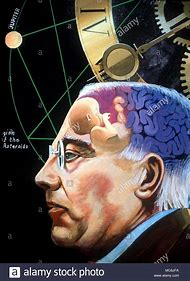The Fourth Way - Study Of Oneself - P.D. Ouspensky - 3






The Fourth Way - Study Of Oneself - P.D. Ouspensky - 3
Q. But how does one attain certainty that your method is right?
A. Just by comparing one observation with another. And then we walk when we meet. people speak about their observations; they compare them; i try to explain what they cannot understand; there are other people who help me; and in that way one becomes sure of ordinary things, just as one knows that grass is green.
There is no question of faith or belief in all of this. Quite the opposite, this system teaches people to believe in absolutely nothing. You must verify everything that you see, hear and feel. Only in that way can you come to something.
At the same time you must realize that our machine does not work perfectly; it works far from perfectly, because of many wrong functions, so that a very importsnt part of self-study is connected with the study of the wrong functions. We must know them in order to eliminate them. And one of the particularly wrong functions, which we sometimes like in ourselves, is imagination.
In this system imagination does not mean conscious or intentional thinking on some subject or visualization of something, but imagination that turns without any control and without any result. It takes very much energy and turns thinking in a wrong direction.
Q.When you say ' imagination', do you mean imagining something to be true, not drawing pictures?
A. Imagination has many aspects; it may just be ordinary day-dreams or, for instance, imagining non-existent powers in oneself. It is the same thing, it works without control, it runs by itself.
Q. Each one is self-deception?
A. One does not take it as self-deception: one imagines something, then believes it and forgets that it was imagination.
Studying man in his present state of sleep, absence of unity, mechanicalness and lack of control, we find several other wrong functions which are the result of his state - in particular, lying to himself and to other people all the time. The psychology of ordinary man could even be called the study of lying, because man lies more than anything else; and as a matter of fact, he cannot speak the truth. It is not so simple to speak the truth;one has to learn how to do it, and sometimes it takes a very long time.
Q. Would you mind explaining what you mean by lying?
A. Lying is thinking or speaking about things that one does not know;this is the beginning of lying. It does mean intentional lying-telling stories, as for instance that there is a bear in the other room. You can go to the other room and see that there is no bear in it. But if you collect all the theories that people put forward on any given subject, without knowing anything about it, you will see where lying begins. Man does not know himself, he does not know anything, yet he has theories about everything. Most of these theories are lying.
Q. I want to know the truth that is good for me to know in my present state. How can I discover whether it is a lie?
A. For almost everything you know you have methods for verifying. But first you must know what you can know and what you cannot. That helps verifying. if you start with that you will soon hear lies, even without thinking. Lies have a different sound, particularly lies about things we cannot know.
Q. As regard to imagination-if you are thinking instead of imagining, should you be aware of the effort all the time?
A. Yes, you will be aware of it-not so much of effort as of control. You will feel that you control things, they do not just go on by themselves.
Q.When you 'remember yourself,' do you mean by that to remember after you have observed yourself, or do you mean to remember the things we know are in us?
A. No, take it apart from observation. To remember oneself means the same thing as to be aware of oneself-'I am
A. ' Sometimes it comes by itself; it is a very strange feeling. it is not a function, not thinking, not feeling; it is a different state of consciousness. By itself it only comes for very short moments, generally in quite new surroundings, and one says to oneself; 'How strange. I am here'. This is self-remembering; at this moment you remember yourself.
Later when you begin to distinguish these moments, you reach anothert interesting conclusion; you realize that what you remember from childhood are only glimpses of self-remembering, because all that you know of ordinary moments is that things have happened. You know you were there, but you do not remember anything exactly; but if this flash happens, then you remember all that surrounded this moment.
Q.Can one with observation be aware that one has not got certain things?
Is one to observe things from the point of view of everything being possible?
A. I do not think it is necessary to use such a word as 'everything'. Just observe, without any guessing, and observe only what you can see. For a long time you just have to observe and try to find out what you can about intellectual, emotional, instinctive and moving functions. From this you may come to the conclusion that you have four definite minds- not only one mind but four different ones. One mind controls intellectual functions, another quite differnt mind controls emotional functions, a third controls instinctive functions.
We call them centres: intellectual centre, emotional centre, moving centre and instinctive centre. They are quite independent. Each centre has its own memory, its own imagination and its own will.
Q. in the case of conflicting desires, i presume that if one had enough knowledge of oneself one would be able to see to it that they did not conflict?
A. Knowledge by itself is not sufficient. One can know and desires can still be in conflict, because each desire represents a differnt will. What we call our will in the ordinary sense is only the resultant of desires. The resultant cometimes reaches a definite line of action and at other times cannot reach any definite line, because one desire goes one way and another another way, and we cannot decide what to do. This is our usual state.
Certainly our future aim must be to come to oneness instead of being many, as we are now, because inored to do anything rightly, to know anything rightly, to arrive anywhere, we must become one. it is a very far aim, and we cannot begin to approach it until we know ourselves, because, in the state in which we are now, our ignorance of ourselves is such that when we see it we begin to be terrified that we may not find our way anywhere.
The human being is a very complicated machine and has to be studied as a machine. We realize that in order to control any kind of machine, such as a motor car or a railway engine, we should first have to learn. We cannot control these machines instinctively, but some reason we think that ordinary instinct is sufficient to control the human machine, although it is so much more complicated. This is one of the first wrong assumptions; we do not realize that we have to learn, that control is a question of knowledge and skill.
Reference: The Fourth Way: P.D Ouspensky
Articles-Popular
- Main
- Contact Us
- Planetary Existences-2
- Planetary Existences
- TWO REVELATIONS-2
- The Two Revelations
- Jeffery Epstein - The Saga - 9
- Jeffery Epstein - The Saga - 8
- Jeffery Epstein - The Saga - 10
- Universality of Initiation
- The Participants In The Mysteries-2
- The Path Of Initiation
- Initiation and the Devas
- The Fourth Way - Study of Oneself - P.D.Ouspensky
- Impeachment Investigators Subpoena White House - Ukraine
- Discipleship - Group Relations - 2
- The Probationary Path - 2
- The Final Initiation
- The Succeeding Two Initiations
- The Participants In The Mysteries
- Discipleship - Group Relationships
- Discipleship
- Jeffery Epstein - The Saga - 7
- The Fourth Way - Wrong Functions - P.D Ouspensky
- Statues are a mark of honour. Like Edward Colston, Cecil Rhodes and Oliver Cromwell have to go
- Jeffery Epstein - The Saga - 6
Articles - Latest
- China's president arrives in Europe to reinvigorate ties at a time of global tensions
- Russia issues WW3 'retaliation' warning to London over Crimea Bridge
- The Tory big beasts tipped to lose their seats
- Andy Burnham makes cheeky request to people of Manchester as he’s re-elected mayor
- The unexpected announcement of a prime minister divides Haiti's newly created transitional council
- Blinken to Hamas: Accept Israel's 'extraordinarily generous' Gaza truce proposal
- 'Loan shark', 83, ordered to pay back over £173,000
- Thai court adds jail time for rights lawyer who urged monarchy reform
- Rapist jailed a decade after campaign of abuse against London woman
- Former SNP council leader appears in court charged with sexual offences
- Former mayor of Winchester smothered elderly mother with cushion, court told
- Spanish PM decides not to quit despite corruption claims against wife
- Scotland's Yousaf set to resign as first minister, UK media say
- Harvey Weinstein's 2020 rape conviction overturned
- Jamaica on track to remove King Charles as head of state by 2025, minister says





